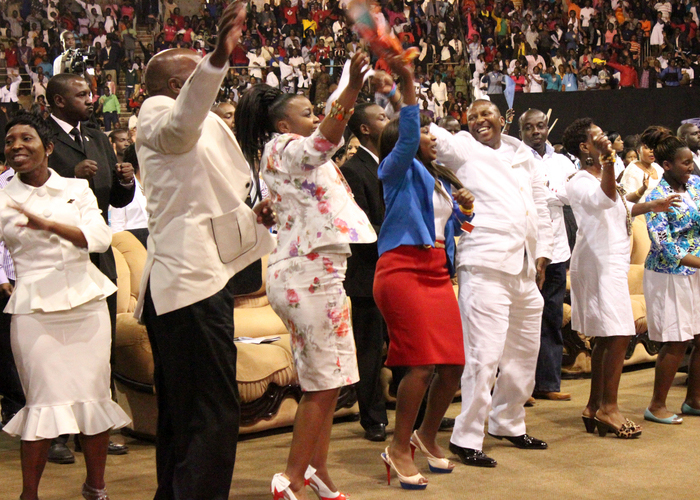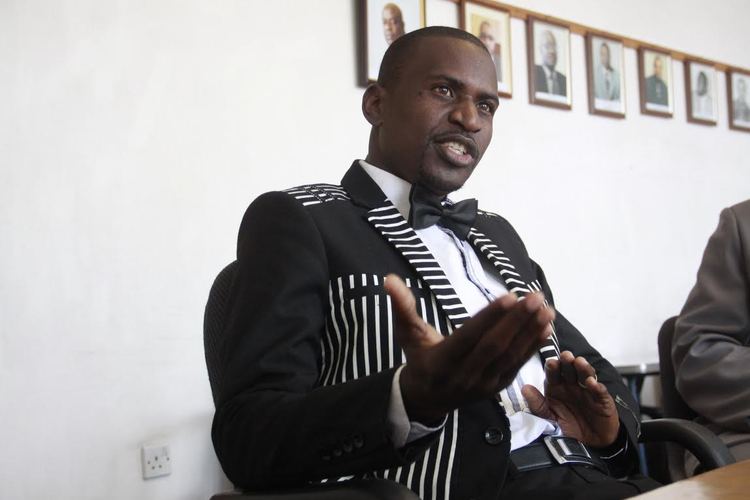
The Sunday Mail

The article “A throwback to medieval, superstitious days” by Darlington Musarurwa in The Sunday Mail of July 20, 2014 was in general powerfully and well-written. Musarurwa’s argument was that much of what we term and describe as religious activity has proven to be superstition and is contributing to our lack of development as a people.
I agree that there is a lot of degenerate religious activity, although the article lacked the description of religion, which I will focus on without being prescriptive.
For the avoidance of doubt, I write this article as a theist, ie one who fully affirms, recognises or acknowledges the existence of the Divine. My theistic perspective, as will be noticed, is not superstitious, fatalistic and unscientific.
In writing this, I have also refrained from denominational peculiarity, distinction and particularity.
Eschewing any form of dogma, this stimulates eager curiosity and free inquiry, encourages creative and innovative ideas, enables continuous discovery and upholds human dignity and worth.
A well-nurtured life means acknowledging and supporting humanity’s capacity to be the centre and instrument of cause and morality with an “unending questioning of basic assumptions and convictions” by being “ever open to experimental testing, newly discovered facts, and more rigorous reasoning”.
This is the affirmation that a human being has the power and agency to creatively and innovatively solve any problem, through reliance primarily upon reason and scientific method applied with humility, fortitude and prudence.
My attempt here is to free religion and its practice from superstitious, fatalistic and unscientific activities.
“Superstition” is the delusional, credulous or unguarded belief and reverence for things not based on reason or knowledge. “Fatalism” is the belief that all events and actions are subject to fate, chance, accident or inevitable pre-determination. “Scientific” is the intellectual and practical effort that encompasses an organised and elaborate understanding of the structure and behaviour of things by way of learning, experiment and observation.
Being superstitious, fatalistic and unscientific is built on human fears, insecurities, vulnerabilities and ignorance.
The word “religion” has been in use since the 13th century, derived from 11th century Anglo-French “religiun”, ultimately from the Latin “religio” – meaning “reverence or devout for the Divine or the divinities, connected with a careful pondering of divine things” (Lewis & Short, ‘A Latin Dictionary).
The word is derived from two Latin words, “re” and “ligare”. As a prefix, “re” means “in the matter of,” “back” or “again”, while the root “ligare” means “to bind, tie, fasten, unite, join or connect”.
Together, “re-ligare” would mean, “to re-bind, re-connect” etc. “Ligare” is also the root of the word “obligation” (“ob-ligare”).
According to Platonist Roman philosopher-politician and lawyer Marcus Tulius Cicero (106-43BCE) in “De NaturaDeorum” (“On the Nature of Gods”), a philosophical dialogue written in 45BCE, the word “religion” was derived from “relegare” which means to “go through again, read again,” from re- “again” + legere “read”.
Ancients then say “religare” means “to bind fast,” “place an obligation on” so that it becomes a “bond between humans and the Divine”.
In simple and plain terms, “religion” is a mental relationship. It is an organised relationship between humanity (the conscious) and the Divine (the subconscious).
Religion would then be the human thoughts, words and actions “to rebind one’s essence to the true nature of reality” which is the Divine.
Religion is a human intellectual construct for an organised re-binding or re-connection with the innermost essence called the Divine. It is a relationship between humanity with the greatest or absolute good (“ensperfectissimum”), ie “the summit of the hierarchy of Self, the ultimate and only completely satisfying object of contemplation and adoration”.
Religion is a humanly constructed series of rites, rituals, ceremonies and activities organised to re-bind and re-connect human beings with the Divine by supplication or appeasement so that the Divine does what one wants done by acting in a “way” to “get” or gain those things or benefits from the Divine.
A relationship with the Divine is a personal and private matter for which the State or any organ of State should not get involved or validate except in cases of the general application of the law.
There are two perspectives of affirming, acknowledging and recognising the existence of the Divine — externally and internally.
A theist of an “externalist approach” considers that the Divine, has a physical address (heaven) somewhere in the universe, has humanoid or anthropological attributes (masculine, fatherly, judgemental, benevolent, etc).
Such a Divine is also said to actively intervene, respond to and get involved in daily human behaviour. In this externalist worldview, the Divine is a humanoid “Infinite Great Being”.
All mainstream religious persuasions (African Traditional Religion, Hinduism, Judaism, Christianity, Islam etc) are institutionalised externalist perspectives.
A theist of an “internalist approach” considers that the Divine is an infinite, immortal and eternal life sustaining cosmic force or energy and breath of life found within humanity in particular and universe in general as cosmic consciousness, intelligence and creativity, and not needing human supplication and attention.
The “internalist” perspectives assess human conduct NOT based private and personal religious convictions and affiliations or lack of them BUT using common human values: Merit (relevant qualification, skills and experience), Prudence (being judicious), and Excellence in character, ie a noticeable and evident sense of integrity, an exemplary and admirable discharge of duty to what is expected in a particular position, and an attention to service as an opportunity to create a positive impact in fellow human beings’ lives.
Such internalist theism makes one feel comforted and encouraged towards a life purpose of being one’s dignified best through reason, discernment and causation underpinned by honour or integrity, virtue and truth.
“A human being is not a physical body with a life force (the Divine) but a life force (the Divine) in a physical body.” This is a theological development of Genesis 1:27 and 2:7.
The Divine is within us as the life sustaining cosmic force or energy, Vital Force (“Elan Vital” in French) beyond the concept of Time and Space. It is called “Ka” in ancient Egypt, “Prana” in Sanskrit and “Chi/Qi” in Chinese, “Ki” in Japanese, “Pneuma” in Greek, “Great Spirit” by Native Americans, “Shekinah” in Hebrew, “Spirit” (Breath of Life, Genesis 1:3, 2:7) in Christian theology, “Energy” in science and “Cosmic Energy” in metaphysics.
Mencius (a Chinese philosopher) described “chi/qi” (life force) as an individual’s vital energy, which is necessary to activities controlled by one’s willpower. Since it is natural, it can be augmented by “means of careful exercise of one’s moral capacities”.
All forms of life and human beings are bearers, means and vehicles of the life sustaining cosmic force or energy.
“We all exist as Divine aspects and expressions of Source Energy, (the Divine), who resides within each and every one of us without exception. And it is (the Divine) within us that ‘doeth the works’, in other words creates through us.
“Everything we experience therefore comes from the inside, created by our thought processes giving rise to a Thought and then Form, and which then manifests outwards into our physical experiential reality. . .
“The Principle of Creation therefore is simple: To realise the Divine within and to create from a position within the Divine…The physical world and our physical bodies are the outermost aspect of the universe. It exists at the lowest rate of energy vibration and the highest density. The centre (the Divine) of all creation is made up of the highest energy vibration and the lowest density.” — Adrian P Cooper, “Our Ultimate Reality, Life, the Universe and Destiny of Mankind” (2007).
The eternal, immortal and infinite life sustaining cosmic force or energy (divinity) in us is “the fuel that fires imagination, lights the torch of inspiration and energises thought”.
Since there is no consensus on the nature of and relationship with the Divine, it is my fervent and humble appeal that the public sphere be freed from religion and religious views. A public sphere being an area or arena in life where citizens can come together to freely gather and discuss information and form opinions for common good.
This explains why the public sphere should be secular.
Secularism is a concept and practice denoting the absence of religious involvement in government and public affairs, as well as the absence of government and public involvement in religious affairs as a domain of private and voluntary associations of the like-minded.
“There is little doubt that religious liberty is best exercised within the setting of the secular state. This does not mean the state should be hostile or indifferent to religious bodies, but rather that it must exhibit what has been called a ‘benevolent neutrality’ . . . Freedom of religion also implies the right not to have or profess a religion.
“This is sometimes overlooked. It is a sad commentary on religion that religionists, probably quite well-meaning at times, have throughout history tried to force fellow human beings into a required religious mold. Apart from the very wrong theological assumptions involved, this is a flagrant violation of the dignity of the human person. Coerced religion is demeaning and of little value.” — Bert B Beach, Seventh-day Adventist religious liberty executive, “Bright Candle of Courage” (1989).
Spanish-American philosopher, essayist, poet and novelist George Santayana, said “Scepticism is the chastity of the intellect, and it is shameful to surrender it too soon or to the first comer: there is nobility in preserving it coolly and proudly through long youth, until at last, in the ripeness of instinct and discretion, it can be safely exchanged for fidelity and happiness.”
Religious or non-religious, all human beings are unique and special expressions of the same life-sustaining cosmic force/energy. Each human being, religious or non-religious, is a mortal being with a dormant usefulness awaiting internal discovery and external actualisation.
Religious authorities should not invalidate the humanity of those of dissimilar or unshared religious views, perspectives and activities.
Being religious should not mean to be under the coercive grip and compulsive control of anyone. This allows one to easily question specific religious tenets and teachings and to avoid living a life in absolute terms.
Without that, you will start eating grass, be walked over and abused — and yet the hospital is the place for professional medical treatment.
Shingai Rukwata Ndoro finds time to freely read. You can contact him at [email protected], and read more of his work on www.shingaindoro.blogspot.com







